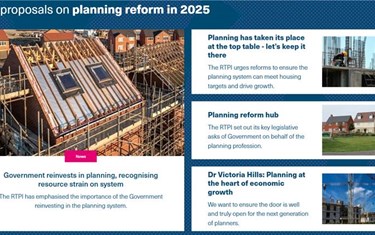 Last week, the Planning and Infrastructure Bill had its Second Reading in the House of Commons, marking the first opportunity for MPs to debate its core principles. While the debate didn’t reveal any major breakthroughs, it’s clear that the outcome is still very much in play.
Last week, the Planning and Infrastructure Bill had its Second Reading in the House of Commons, marking the first opportunity for MPs to debate its core principles. While the debate didn’t reveal any major breakthroughs, it’s clear that the outcome is still very much in play.
With the Government’s Easter recess rapidly approaching, we can expect to hear some critically important discussions around planning to slow down for a couple of weeks. But before we take a step back, let’s take a moment to outline what we’re advocating for.
This isn’t just about an opportunity to revitalise the system and reaffirm the important role planning in delivering sustainable places whilst delivering much needed growth. It’s about ensuring professional competent planners sit at the decision-making top table, professionally guiding choices that directly impact the communities they serve through competing demands for scarce resources.
At the heart of our key legislative asks is the belief that every Local Planning Authority in England should have a statutory Chief Planning Officer. This role would be crucial for providing impartial professional advice to elected members and build a critical relationship necessary for effective local decision making.
Under the local authority’s Scheme of Delegation, Chief Planning Officers are entrusted with the powers to make the all important determinations that not only deliver the impacts that communities want, but that contribute to the growth of the economy, leading to better outcomes for all. However, our research reveals that just 23% of Local Planning Authorities have a head of planning service who reports directly to the council’s Chief Executive, and a staggering 9% of councils have no clear "head of planning service" at all. This can’t continue to the newly recharged planning framework.
Every planning department must have a Chief Planning Officer at the leadership level to bridge the gap between development management and development planning functions. When these functions are divided, performance, and sometimes morale, and recruitment and retention of staff, often suffers, as is well documented.
A similar model to the one we’re proposing was adopted in Scotland in April 2024, with new guidance outlining the Chief Planning Officer’s role and responsibilities. These new roles could be based on the Scottish model, or follow the proposals put forward by Lisa Nandy MP during the Levelling Up and Regeneration Bill.
In her proposal, Lisa Nandy, as Shadow Secretary of State for Levelling Up, Housing and Communities, stated that a Chief Planning Officer must have appropriate qualifications and experience for the role. These new mandatory roles, we believe, would need to mandate professional competency, for example through RTPI Chartership, as the cornerstone for their qualifications, ensuring ongoing training, and upholding professional and ethical standards in the field.
The Government has made it clear how essential planning is for delivering its growth agenda. We will continue to work tirelessly to ensure that planning remains central to the conversation, backed by the resources and leadership needed to create sustainable, vibrant communities for all.


